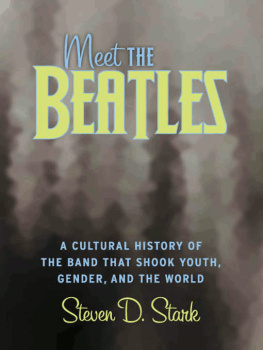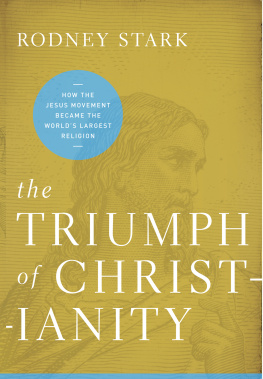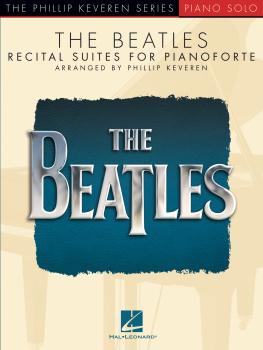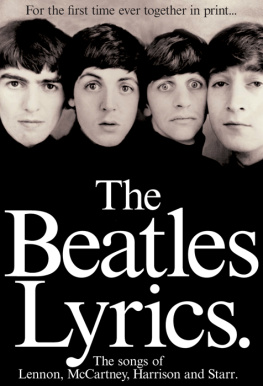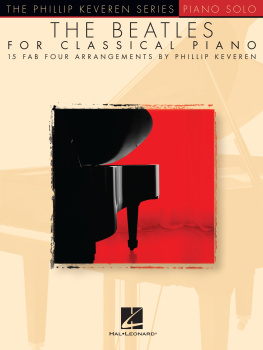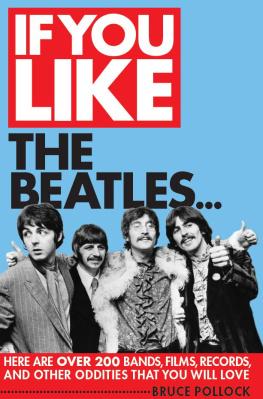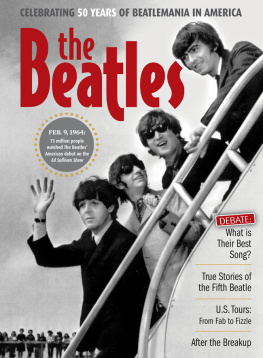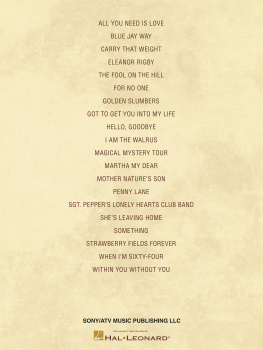CONTENTS
THE BRITISH ARE COMING!
LIVERPOOL: ROOTS AND REGRETS
A COMMUNAL GANG OF ARTISTS
ASTRID, HAMBURG, AND THE GREAT TRANSFORMATION
THE PARENTAL OUTSIDERS: MONA AND BRIAN
RESHUFFLING THE BAND WITH HUMOR
FIRST RUMBLINGS OF A GENDER REVOLUTION
ENGRAVED UPON THE HEART OF ITS NATION
HERE, THERE, AND EVERYWHERE IN 1964
HAIR, DRUGS, AND ROCK AND ROLL
SGT. PEPPERS COSMIC COUNTERCULTURE
OUT OF SYNC
LOVE IS ALL YOU NEED
GROWING OLDER, LOSING FAITH
WHY on earth would anyone need another book about the Beatles? Hundreds of volumes have been written about the group in a multitude of languages, describing everything from their musical scores (which they never wrote down because they could neither read nor write music) to a virtual hour-by-hour chronology of each Beatles day. Their story has become our contemporary version of the Gospels, each disciple faithfully setting down what Saint John or Saint Paul said to him when it came time to write She Loves You or to visit the maharishi in India. As the British rock writer Charles Shaar Murray once put it, theirs is the greatest story ever told and told and told and TOLD . And, unlike other pop phenomena, they seem, amazingly, to grow bigger by the year.
To a certain extent, almost all the books about the Beatleseven the so-called objective historiesare a form of fan literature: Dont tell me what it means, just tell me again what happened, is the way a critic once put it. As such, these books always seem to me to miss the key elements of our modern version of the greatest story ever told. They tell the what, without ever really explaining the why. I decided to try to write a serious cultural history that focused on that why .
The Beatles were, of course, brilliant songwriters and innovative musicians. During their heyday, they sold more records than any entertainers ever, releasing around two hundred songs as a group in the eight years they remained together once they received a recording contract. Yet looking mostly at their musicas most analysts doprovides an inadequate means to assess their impact. Their music was wonderful, but so was Beethovens and even Irving Berlins, and no one is going to annual Irving Berlin conventions or publishing biographies of him by the bucketfuls year after year. The Beatles became historical forces for reasons that transcended their songs.
Derek Taylor, their clever confidant and press officer, understood this well. The Beatles are not a pop group, he once said. They are an abstractiona repository for many things. To understand this group, one has to grasp the larger cultural forces they triggered and came to represent that enabled them to make their mark.
Thats what this book aims to do. If one had set out to predict the history of the second half of the twentieth century, one would never have surmised that four musiciansfrom Liverpool, England, of all placeswould end up becoming the cynosure of the worlds eyes and one of the centurys major symbols of cultural transformation. Whats more, its never been clearly explained why their popularity and renown show few signs of diminishing in the first decade of a new century. More than forty years after they first hit the U.S. charts with I Want to Hold Your Hand and She Loves You, anything connected to the Beatles continues to attract huge and adoring audiencesfrom compilations of their old hits, to auctions of their relics, to reminiscences by their friends and acquaintances. They are, said Taylor, the longest-running saga since World War II.
To undertake this project, I ended up moving temporarily to England, near Merseyside, and I hope some of the many unexpected differences I found between the United States and the northwest of England have informed the book. A Beatles cultural historian needs to understand two very different worlds: the one that produced them, and the American one that adopted them and, as the engine of international popular culture, remains the principal legatee of the groups existence despite their English origins. After all, its one thing as an American to talk to old English friends and fans of the Fab Four; its quite another to live every day steeped in the unique region and culture that shaped them.
As I researched their story, several themes emerged strongly that I think are crucial to understanding both how and why the group was unique. First, if not always intentionally, the Beatles helped feminize the culture. The feminine side of society was represented by them in some way, Yoko Ono once said, but thats understating the case. Elvis Presley may have started a revolution, but it wasnt primarily a gender revolution until the Beatles came along and helped remake the musicand then the culturein their own image. With the prominence they accorded to women in their songs and lives and the way they spoke to millions of young teenage girls about new possibilities, the Beatles tapped into something much larger than themselves.
The Beatles were constantly drawn to strong women who, in turn, then shaped them. And, because of their background, the Beatles were able to identify far more strongly than their counterparts with the sensibility of their female audienceswhich then allowed them to energize these female fans in a unique way.
To many, the hysteria known as Beatlemania, with its peculiar empowerment of young women, remains a significant event in the first stirrings of the gender revolution. Female fans had gone mad for Elvis, Frank Sinatra, Valentino, and even Franz Liszt in the past. But the world had seen nothing beforenor has it sinceto rival the pandemonium that greeted the Fab Four everywhere they went.
They were the great can opener of culture in the twentieth century, said Robin Richman, who reported on the era for Life magazine. There was a wave of exuberance among girls they triggered that broke down the last restraints of the Victorian era.
The Beatles also challenged the definition that existed during their time of what it meant to be a man. This ultimately allowed them to help change the way men feel, the way men look, and the way men think about the way they look. Brian Epstein, their gay manager, influenced the group in many ways, but his most lasting contribution was to help design an image for the group that explored the fluidity of gender. It was a quest they had already begun on their own before they met him and which they continued even after his death in 1967.
The Beatles set the tone for feminism, said University of Minnesota history professor Elaine Tyler May. And that meant they recognized in their own way that men have to change too in order to permit that revolution to happen.
After all, to many of their contemporaries, the Beatles initially looked and sounded like women. With their long hair, the boys were initially labeled as girls; their vocal signature in the early days was a high feminine falsetto ooh (She Loves You). Chuck Berry would never have sung a song as personal and as vulnerable as 1965s Youve Got to Hide Your Love Away. In fact, when George Martin, their record producer, first heard John and Paul sing She Loves You, he exclaimed, Well, you cant do the end of courseits too like the Andrews Sisters!
This focus on gender may have come naturally to the Beatles given their immersion in an English culture with a tradition from James I to Oscar Wilde and beyond of playing with the malleability of the concept. But it was very new to the rest of the world, particularly to Americans. Put another way: The Beach Boys, Bob Dylan, and James Brown were many things, but androgynous was not among them.
Second, the Beatles converged with their era in an almost unprecedented way. They were of their time, said their producer George Martin, and that time, of course, was the 1960s. The late Beatle scholar Ian MacDonald may have been exaggerating a bit when he described the sixties as a historical chasm between one way of life and another. Still, most would agree with analyst John Judis that the sixties have preoccupied modern America almost as much as the Civil War preoccupied late-nineteenth-century America. The sixties, Judis wrote, have sparked debates about the quality of life and about lifestyle rather than simply about making a living. The sixties unleashed conflicts within these new areas of concernover affirmative action, abortion, homosexuality, drugs, rock lyrics, [and] air pollution, many of which still preoccupy us today.

